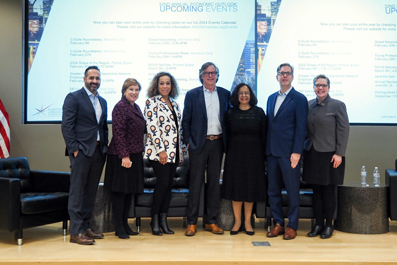On Jan. 30, the Northern Virginia Chamber of Commerce and NOVA launched the third annual Northern Virginia Workforce Index at the Chamber’s 32nd Annual Economic Outlook Summit at George Mason University’s Van Metre Hall. This comprehensive forecasting tool, developed with support from the University of Virginia's Center for Survey Research, is an annual survey of area employers, the results of which provide valuable insights into our region’s current and future workforce, including hiring trends, demographic shifts and economic perspectives.

The 2023 Workforce Index reveals that a tight labor market and high labor costs continue to make hiring and retaining talent a challenge for Northern Virginia businesses. At the Economic Outlook event, that challenge, among others, was the focus of an impressive panel led by Bert Pallia, portfolio vice president of strategic accounts at Appian Corporation. Panelists included Benita Thompson-Byas, senior vice president and vice chairman of the board at Thompson Hospitality Corporation; Michael Beckley, founder and CTO at Appian; and Christopher Clemente, chairman of the board of directors and CEO at Comstock.
NOVA President Anne M. Kress delivered the keynote address and noted that the results of the latest survey represent the highest level of participation among businesses in our region since the report’s inception three years ago.
“Employment in our region is up and on par with the nation’s top 10 MSAs [metropolitan statistical areas]. Hiring has increased, and it will increase next year,” noted Kress. She went on to say how “that success also highlights the region’s challenge — workforce availability.”
NOVA, as the largest supplier of talent to the region, seeks to address that very issue through its industry-informed applied degree and workforce credential programs. The College also aims to facilitate hiring by forming strategic relationships with area employers, encouraging them to tap into NOVA’s wide-ranging talent pool through experiential learning opportunities like internships and apprenticeships. According to the results of the 2023 Workforce Index, however, such work-based learning continues to be underutilized as a regular recruiting tool, with fewer than half of respondents indicating that they use internships to recruit talent, and fewer than a quarter indicating that they use apprenticeships.
More key trends from the report:
- Over a quarter of businesses, compared to just 18% last year, reported anticipating increased reliance on part-time, temporary or contract workers in the future.
- This year’s Index revealed a notable decline in businesses reporting an increased focus on diversity, equity and inclusion (DEI) efforts in hiring practices. While last year’s Index indicated that 29% of businesses anticipated greater emphasis on DEI efforts in hiring, that number dropped to 22% this year.
- About a third of businesses reported returning to pre-pandemic in-person work patterns, versus a majority-virtual workforce that rose to new heights during the pandemic. In fact, 33% and 34% of businesses surveyed, respectively, indicated that the share of employees who can telework and the number of hours per week that employees can telework have returned to pre-pandemic levels. In 2022, these percentages were 26% and 29%. This could reflect a stronger preference by many companies nationwide — including at larger corporations like Amazon and Apple — for their employees to return to predominantly in-person work.
- In 2023, the Commonwealth of Virginia eliminated educational degree requirements for approximately 90% of state government jobs. (See Laura Vozzella’s Washington Post article on the topic here.) In fact, Va. Governor Glenn Youngkin’s decision to do so represents the latest in a nationwide push away from degree requirements in favor of skills-based hiring.
Panel questions at the launch event centered around businesses’ adoption of advanced technologies, including artificial intelligence (AI), along with the challenges and opportunities that accompany such innovation. Said Kress, “Every industry is responding to the AI challenge. Only 5% noted no increase [in how AI affects their work]. What this is telling us is that every job is a technology job.”
Expanding on that notion, Benita Thompson-Byas said of Thompson Hospitality, “We are mainly looking at technology to enhance the customer experience [and] to make our employees’ lives better. That way, they have a more efficient and streamlined way to process orders.” She noted the intention of implementing advanced technologies “is not to … eliminate jobs but to make jobs easier.” Christopher Clemente felt differently, however, remarking how the increased efficiencies AI makes possible will ultimately affect “how many people [Comstock] needs.”
What is indisputable is that AI and other advanced technologies will bring about rapid change. Appian’s Michael Beckley sees that change as a new era of innovation more than 100 years in the making: “I … see a nation that is poised for another decade of growth, much like the Roaring Twenties a century ago. The opportunity is there, the demand is there. The question is, do we have the vision and foresight … to break through … structural barriers [and] unleash that potential?”
The Northern Virginia Workforce Index and the Annual Economic Outlook Summit are important tools to keep a finger on the pulse of the region’s workforce trends. The partnership between NOVA and the Northern Virginia Chamber of Commerce, as well as myriad employer partners throughout the region, ensures the pipeline of workers in critical fields remains robust and continuous and that the Northern Virginia region continues to thrive with a satisfied and sustainable workforce.
The executive summary and full Workforce Index can be found here.